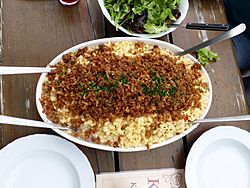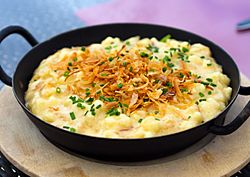Käsespätzle facts for kids
 |
|
| Alternative names | Käsknöpfle |
|---|---|
| Type | Noodles |
| Place of origin | Germany |
| Region or state | Swabia |
| Main ingredients | Spätzle, cheese, onions |
Käsespätzle (German for "spätzle with cheese", also called Käsknöpfle in Vorarlberg and Liechtenstein or Kasnocken in Tyrol) is a traditional dish of the German regions of Swabia, Baden and Allgäu, and also in the Austrian regions Vorarlberg and Tyrol, as well as Liechtenstein and Switzerland.
Preparation
Hot spätzle and grated cheese, such as Emmentaler or granular cheese, are layered alternately and are finally decorated with fried onions. After adding each layer, the käsespätzle is put into the oven until warmed and the cheese is melted.
Accompanying side dishes are green salads or potato salad. In Vorarlberg and also in Liechtenstein käsespätzle is usually served with apple sauce. Leftovers of käsespätzle can be fried with butter in a pan.
Regional specialities
In Swabia käsespätzle are prepared with Bergkäse or Emmental cheese, optionally with both. In Vorarlberg two different cheese varieties are dominating, so in Montafon the cooks use Montafon sour cheese and in Bregenz Forest they use Bergkäse and Räßkäse, a local hard cheese.
Side dishes in Vorarlberg are butter and yellowly tarnished onion rings.
Different variations are found with Limburger, Weisslacker or Vorarlberger Bergkäse.
Variations
A variation of käsespätzle are so called Kasnocken or Kasnockn coming from Salzburg and Obersteiermark, both parts of Austria. These are fried in a pan. Grated cheese and spätzle, freshly scraped from a board, are mixed together and are heated in a pan.


